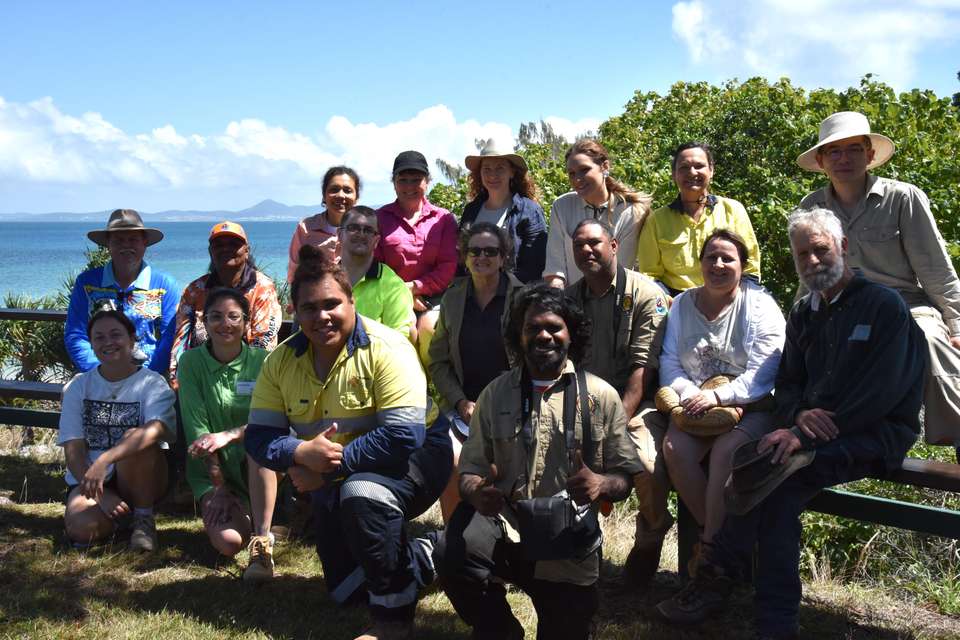Caring for Land and Sea Country: a Konomie Island adventure
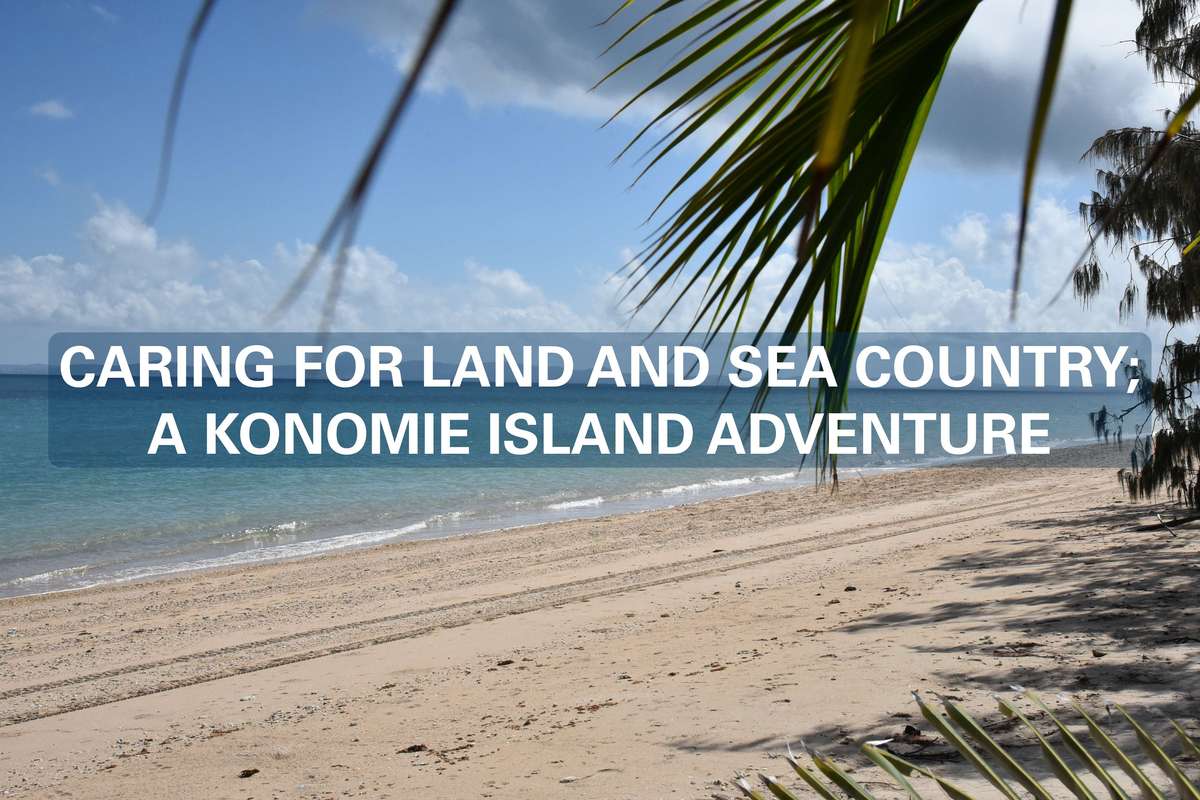
Transcript
Sophie George:
So what we're doing today is caring for Country and we're healing Country. So this is Woppaburra Country that we are on, we are on Konomie Island. I love working on Konomie Island, and working in partnership with the Woppaburra People under their guidance and through their lead of the ongoing care for this Country.
So all the Woppaburra islands are incredibly important, there is a lot of sacred sites over here on Konomie Island which are incredibly significant, so when we're working in the education centre we stay in this area which we have permission to be on, but when you come over to this island it's very important to have much yadaba, much respect; stick to the tracks, take nothing with you but memories and photos, and care for this Country everywhere you walk.
So we're going to pull out the weeds across this little area, we're going to be focusing on certain weeds species and completely eradicating them. We do everything by hand so we're not using any chemicals or any pesticides. You might not be able to see it but the beautiful Great Barrier Reef is right there, so once we remove these weeds it will give the native plants the opportunity to come back and regenerate the landscape how it was once was before colonisation and invasion.
I've been coming to the island for maybe 2 years and it has been such an incredible difference in the landscape and that native vegetation coming back through every little bit helps, so to have these guys over here today - and you can see me working with the Woorabinda Rangers - it all makes a difference; every weed pulled and tree planted and watered actually really does make a difference to this ecosystem so I'm just so appreciative to be part of that journey.
Kylie Johnston:
So today we've taken out three particular types of weed: the Oxalis and the painted spurge and some red nuttle grass, and also some burr. So the island was originally covered in a lot of burr, so slowly but surely we've been removing that.
It's hard to describe in words but it really does feel like you're giving back to look after Country and care for the island so that it's here for the next generations. so yeah I've been I feel really special to be able to be a part of it yeah. It's a feeling or a knowing, and it's a meeting up, and it's a connection with the creatures that you encounter. So like today we went to a beach, Mazie Bay, and there was a dugong there and it just floated and then popped its little head up and spouted water, and so it was a moment where it's captures your heart melts your heart. Yeah so yeah it's that kind of thing, it's it's being present. I would love - I'm going to come back, I'm going to come back and do lots more work with the P&C here at Konomie and with Central Queensland University. This is my second time with them to come over to the island; last time we planted some plants and we did some weed management, so definitely keen and will be back. If anyone can have an opportunity to come to Konomie and they're invited, the museum that they've built here on the island it's very interesting, and the welcome that you get when you come on to the island there's a little cultural practice that you do there when you come onto the island it just, it really grounds you. I'll say goodbye on the way out and I'll say thank you, yeah for keeping me safe on this Country today.
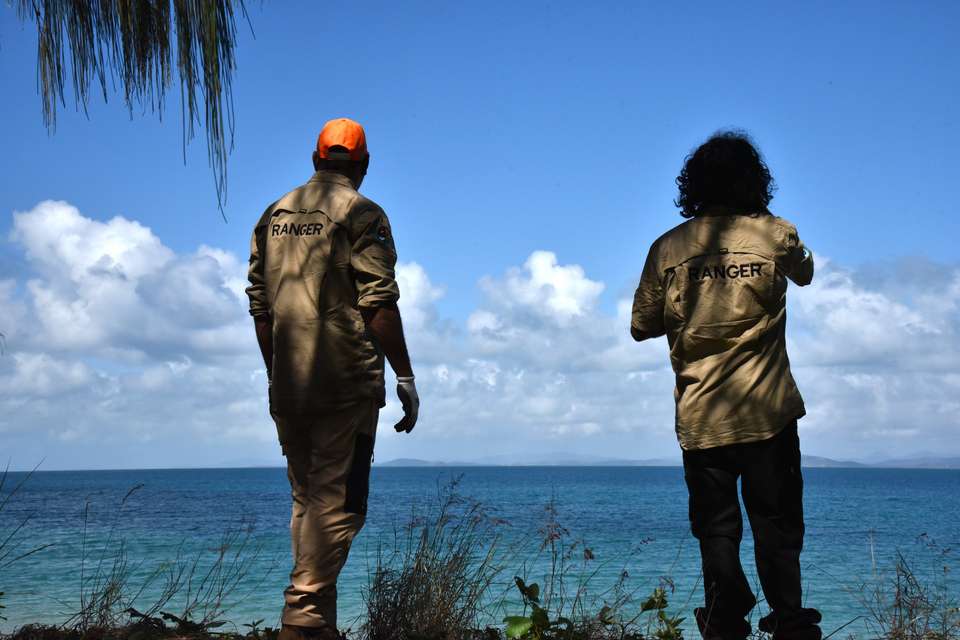
By Sala Mkoka
CQUniversity horticulture and conservation students recently embarked on an island expedition to Konomie Island, undertaking vital revegetation work to restore native bushland.
Working alongside the Capricorn Conservation Council, Woorabinda Aboriginal Shire Council Rangers and the Konomie Island Environmental Education Centre P&C (KIEEC), the students were able to further their knowledge and understanding of protecting and conserving biodiversity, and how to collaboratively partake in caring for Country.
Located on Woppaburra Country (Keppel Bay Islands National Park), the Environmental Education Centre on Konomie Island meaning ‘North Wind’, exists as a sustainable ecosystem with its own solar power source, small wind farm, recycled water source, and seagrass nursery, staking its claim as a unique biodiverse habitat and self-sustaining island.
Under the direction of the KIEEC P&C, students assisted with exotic weed removal and disposal, deep planting and revegetation of sustainable native species, and broadened their knowledge of plant identification, how to create sustainable ecosystems, and protect native flora and fauna.
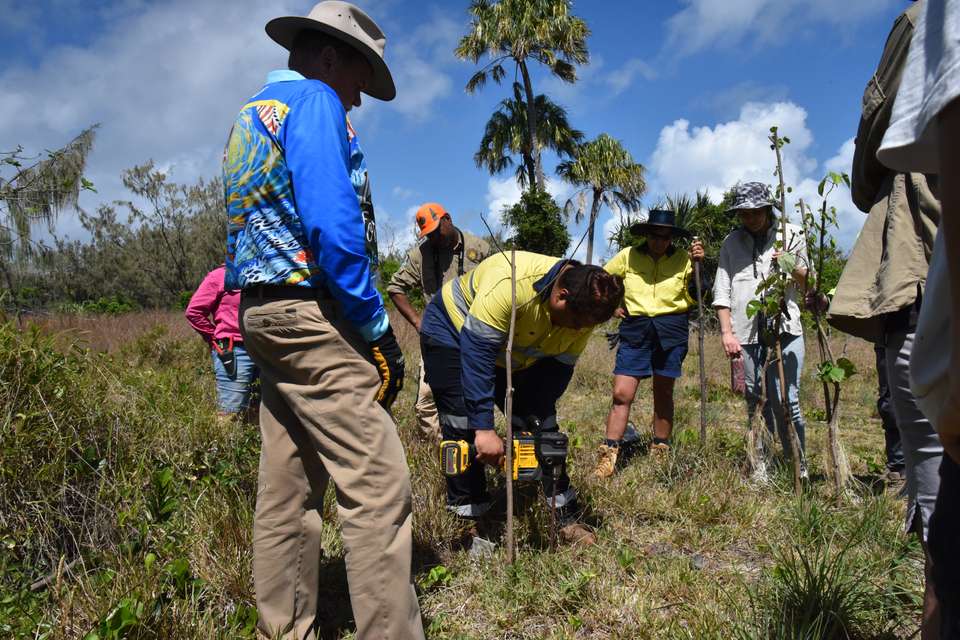
KIEEC P&C President Jeff Krause said the proliferation of exotic weeds on the island since being introduced in the era of colonisation, causes degradation of native plant species and threatens to overrun a healthy-functioning ecosystem, which requires frequent land care to maintain.
“We’ve seen that the exotic weeds spread very easily and crowd everything else out, becoming entwined with the native flora, so it’s important that we educate ourselves on plant identification to carefully discern exactly what should be removed,” Mr Krause said.
“Once the native plants are significantly established, they are then more likely to outcompete the weeds, but without the existence of the native plants, the weeds will continue to dominate the landscape.”
CQUniversity academic and Capricorn Conservation Council Coordinator (CCC) Sophie George who co-led the excursion, is also part of the KIEEC P&C and assists with revegetation on the island every fortnight, and said that protecting biodiversity is essential in caring for Country.
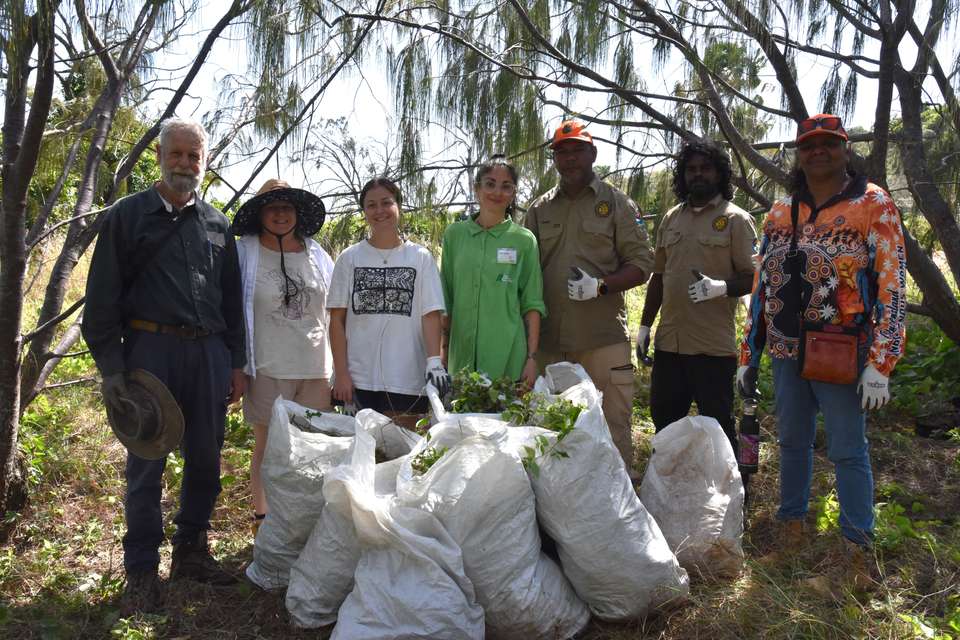
“It has been absolutely vital to come together to partake in the important work of healing Country,” Ms George said.
“We do this by protecting and caring for biodiversity, and some of the ways we go about that is through regular weed removal and replanting of native species.
“As Konomie Island is located at the southern end of the Great Barrier Reef, it’s critical that this ecosystem thrives, so by removing weeds we’re making way for native flora to regenerate and return to its former state before colonisation.”
Having worked on Konomie Island for the last two years with the CCC, Ms George has seen the radical transformation their work has made to the land and sea habitat, and emphasised the importance of community partnerships and working in collaboration with the Woppaburra People under their guidance and leadership of ongoing care for the land.
“There are many sacred sites on this island, so it is important that when we visit to have much yadaba (respect); stick to the tracks and take nothing with you but memories and photos and really take care of this Country.
“I’m so appreciative and fortunate to be part of this journey, and every little bit helps – every weed pulled, and tree planted and watered really does make such a difference to restoring a more resilient ecosystem.”
The experience of caring for Country and connecting with the land was one that was unforgettable for CQUniversity Horticulture student and proud Byellee woman Kylie Johnston, who took home a special memory with her from the day, as one of the few students who witnessed a dugong in the wild at Mazie Bay.
“It’s about being present and really connecting with the land,” Ms Johnston said.
“After all of our efforts today, to see a dugong pop it’s head up and say ‘thank you’ was very special. Through the work we’ve done, it really feels like you’re giving back to the community of Konomie and the Elders.
“To look after Country and care for the island for the next generation, is a really special experience that is hard to put into words.”
Konomie Island is located 12km off the coast of Yeppoon on the Capricorn Coast in Central Queensland, and is completely surrounded by the waters of the Great Barrier Reef World Heritage Area.
Learn more about CQUniversity's TAFE courses in Conservation via the course pages.
